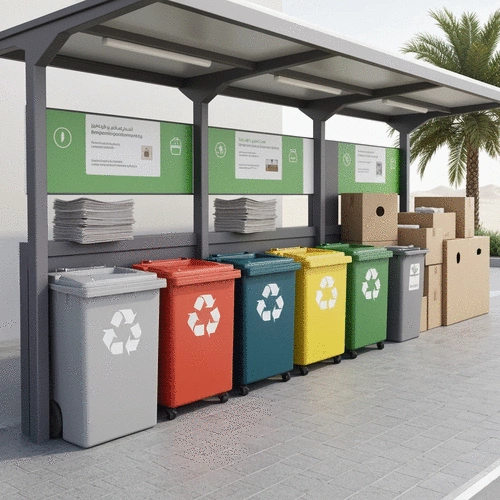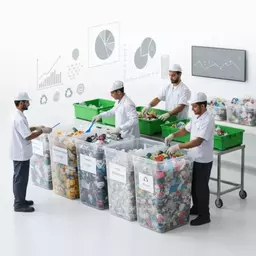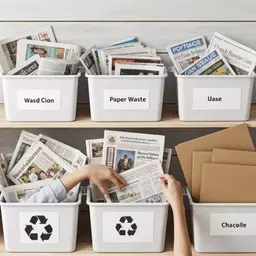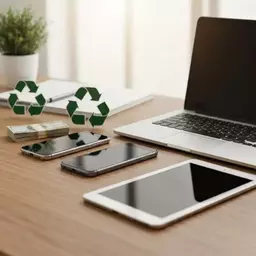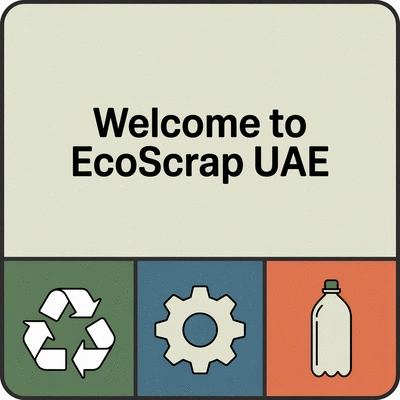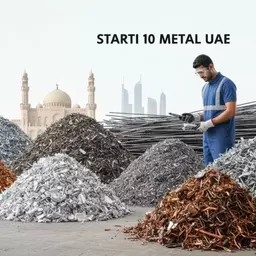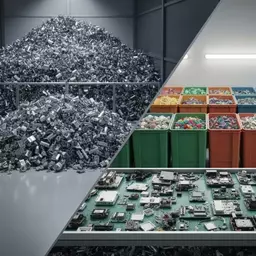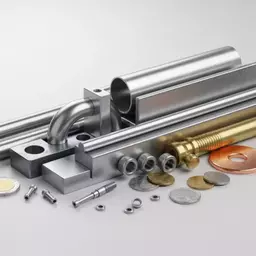Did you know that recycling paper can significantly reduce the environmental impact of urban waste? In the UAE, where rapid urbanization has increased waste generation, understanding the importance of paper waste recycling is crucial for a sustainable future.
What You Will Learn
- Recycling paper conserves natural resources by reducing the need for logging, preserving vital habitats.
- The process of recycling paper consumes less energy compared to producing new paper, thereby lowering carbon emissions.
- Proper paper recycling mitigates climate change by decreasing methane emissions from landfills.
- Increased awareness and community engagement have led to significant strides in paper recycling efforts in the UAE.
- Recycling can result in economic benefits, such as cost savings for businesses and job creation in the recycling sector.
- Understanding the paper recycling process can empower individuals to participate in sustainable practices effectively.
The Paper Recycling Process in the UAE: A Step-by-Step Overview
This visual outlines the key stages of paper recycling in the UAE, from collection to reprocessing, highlighting the transformation of waste into new resources.
Step 1: Collection
Gathering used paper from homes, offices, and recycling bins.
Step 2: Sorting
Classifying paper by type and quality, removing non-recyclables.
Step 3: Cleaning
Removing contaminants like staples and tape to ensure material purity.
Step 4: Processing
Pulping sorted paper and transforming it into new paper products.
Understanding the Importance of Paper Waste Recycling in the UAE
When it comes to reducing our environmental footprint, recycling paper is a crucial step. In the UAE, where rapid urbanization and development have led to an increase in waste generation, understanding the importance of paper waste recycling is vital. Not only does recycling help conserve natural resources, but it also plays a significant role in protecting our ecosystems.
As a strong advocate for sustainable practices, I believe that every piece of paper recycled contributes to a larger goal of environmental stewardship. By participating in recycling initiatives, we can collectively work towards a greener future for the UAE!
Why Recycling Paper Matters for the Environment
Recycling paper is essential for several reasons. First and foremost, it helps to reduce the demand for virgin materials, which often involves deforestation. By recycling, we ensure that fewer trees are cut down, preserving vital habitats and promoting biodiversity. Additionally, recycling paper consumes less energy compared to producing new paper from raw materials, significantly lowering carbon emissions.
- Conserves natural resources by reducing the need for logging.
- Decreases energy consumption in the paper production process.
- Reduces landfill waste, which contributes to environmental pollution.
Furthermore, recycling paper can help mitigate climate change. By decreasing the amount of waste sent to landfills, we reduce methane emissions, a potent greenhouse gas. As someone dedicated to promoting responsible waste management through EcoScrap UAE, I see firsthand how impactful these small actions can be!
Current Paper Recycling Trends in the UAE
In recent years, the UAE has made significant strides in enhancing paper recycling efforts. According to recent reports, the overall recycling rate for paper has shown promising growth, driven by both governmental initiatives and community engagement. More residents recognize the benefits of recycling, participating in various local programs.
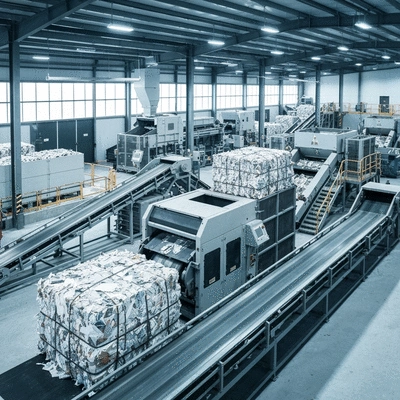
The UAE is actively pursuing a circular economy, aiming to minimize waste and maximize resource utilization. This includes embracing advanced recycling methods and encouraging businesses to adopt sustainable practices. Such initiatives are crucial in transforming the country's waste management landscape.
- Government campaigns to raise awareness about recycling.
- Increased availability of recycling bins in public spaces.
- Partnerships with local businesses to promote sustainable practices.
With the support of organizations like EcoScrap UAE, we’re committed to further advancing these efforts. Together, we can create a culture of recycling that resonates throughout our communities, inspiring more people to take part in this essential practice.
Environmental Impact of Paper Waste on the UAE's Ecosystem
The impact of paper waste on the UAE's ecosystem cannot be overstated. When paper waste is not recycled properly, it contributes to growing landfill sites, causing soil and water contamination. This waste can also lead to increased carbon emissions as paper decomposes, releasing harmful gases into the atmosphere.
Moreover, improper disposal of paper can disrupt local wildlife habitats. By recycling, we significantly reduce these risks and foster a healthier environment. It’s crucial to remember that every bit of paper we recycle leads us closer to a sustainable future.
Recycling Benefits: Economic and Environmental Advantages
Recycling paper not only benefits the environment but also presents several economic advantages. For businesses, engaging in recycling practices can lead to cost savings as they minimize waste disposal fees. Furthermore, recycling can create new job opportunities within the recycling industry, promoting local economic growth. The Middle East waste recycling services market is experiencing significant growth, highlighting the economic viability and potential for job creation in this sector.
- Cost savings on waste management for households and businesses.
- Job creation within the recycling sector.
- Increased economic activity through sustainable practices.
By understanding and advocating for the benefits of paper recycling, we can inspire others to join in these efforts. At EcoScrap UAE, we are dedicated to not only recycling but also educating our community on how each small action can lead to significant change. Let’s embrace recycling and work towards a more sustainable UAE together!
We Want to Hear From You!
What motivates you to recycle paper? Is it environmental concerns, economic benefits, or perhaps something else? Share your thoughts below:
Frequently Asked Questions About Paper Recycling in the UAE
Q: Why is paper recycling important in the UAE?
A: Paper recycling is crucial in the UAE due to rapid urbanization and increased waste generation. It helps conserve natural resources, reduce energy consumption, lower carbon emissions, and mitigate climate change by decreasing landfill waste.
Q: What are the main steps in the paper recycling process?
A: The main steps include Collection (gathering used paper), Sorting (classifying by type and quality), Cleaning (removing contaminants), and Processing (pulping and transforming into new products).
Q: How does paper recycling benefit the environment?
A: It conserves natural resources by reducing the need for logging, decreases energy consumption and carbon emissions, reduces landfill waste, and helps mitigate climate change by cutting methane emissions.
Q: What are the economic benefits of paper recycling?
A: Economic benefits include cost savings for businesses on waste disposal fees, and the creation of new job opportunities within the growing recycling industry in the UAE.
Q: What role do individuals play in paper recycling efforts?
A: Individuals play a vital role by participating in local recycling programs, properly sorting their paper waste, and raising awareness within their communities. Their actions contribute directly to a greener future.
Exploring the Paper Recycling Process in the UAE
Understanding the paper recycling process is essential for anyone looking to contribute to a more sustainable future. At EcoScrap UAE, we believe that knowledge empowers action, and by knowing how your paper waste is transformed, you can feel more connected to the process. Let's delve into the steps involved in recycling paper in the UAE!
Step-by-Step Overview of Paper Recycling
The paper recycling process encompasses several stages, each crucial in ensuring maximum recovery of materials. Here’s a simplified breakdown:
- Collection: This initial step involves gathering used paper from various sources, such as homes, offices, and recycling bins.
- Sorting: Once collected, paper is sorted based on its type and quality.
- Cleaning: Contaminants like staples and tape are removed to ensure clean material for processing.
- Processing: The sorted paper is then pulped and transformed into new paper products.
By following these steps, recycling facilities can effectively turn waste paper into valuable resources, reducing the need for virgin materials. It’s a win-win situation for everyone involved!
Sorting and Cleaning: Preparing Paper for Reprocessing
Sorting and cleaning are critical steps in the recycling process. When paper arrives at the recycling center, it undergoes detailed sorting to remove non-recyclable items. This ensures that only clean, high-quality paper is processed. Additionally, cleaning helps prevent contamination, which can significantly affect the quality of recycled paper. Achieving zero-waste goals often hinges on effective sorting and cleaning processes at the initial stages of recycling.
- Types of paper commonly recycled: newspapers, magazines, office paper, and cardboard.
- Common contaminants to watch for: plastic covers, food residues, and non-paper materials.
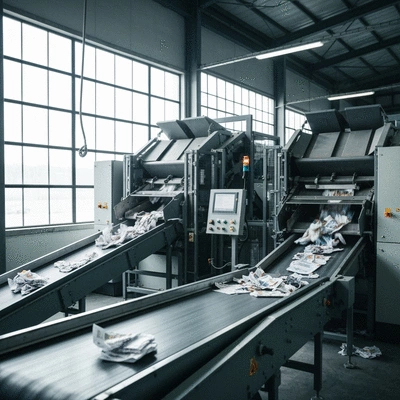
As someone passionate about waste management, I can’t stress enough how important these initial steps are. The cleaner the materials, the better the recycling outcome!
Reprocessing Techniques Used in UAE Facilities
In the UAE, various reprocessing techniques are employed to convert waste paper into new products. These methods can differ based on the type of paper being recycled and the facility's capabilities. Here are some common techniques:
- Pulping: Paper is mixed with water and chemicals to break it down into fibers.
- Deinking: This process removes inks and dyes from the paper to produce cleaner pulp.
- Sheet Formation: The cleaned pulp is formed into sheets and dried for further processing.
These advanced techniques play a significant role in enhancing the quality of recycled paper, making it suitable for various applications. Knowing what happens during these stages can inspire more people to engage in recycling!
The Role of Recycling Equipment in Efficient Paper Recovery
Modern recycling facilities utilize advanced equipment to maximize efficiency in the paper recycling process. Here are a few key tools:
- Shredders: These break down large volumes of paper quickly.
- Pulpers: Essential for transforming paper into slurry.
- Sorting Machines: These help automate the sorting process, improving accuracy and speed.
At EcoScrap UAE, we are keen on using cutting-edge technology to enhance our services. The right equipment not only streamlines operations but also significantly boosts the recycling rate, benefiting our environment!
Recap of Key Points
Here is a quick recap of the important points discussed in the article:
- Recycling paper conserves natural resources by reducing the need for logging and deforestation.
- It decreases energy consumption and lowers carbon emissions during the paper production process.
- Increasing awareness and community engagement are driving the growth of paper recycling rates in the UAE.
- Proper recycling mitigates the environmental impact of paper waste on ecosystems, reducing landfill waste and pollution.
- Economic benefits include cost savings for businesses and job creation within the recycling sector.
- Understanding the paper recycling process empowers individuals to participate effectively in recycling initiatives.

